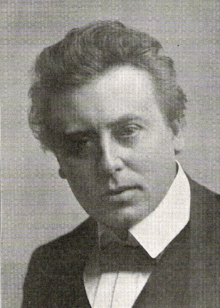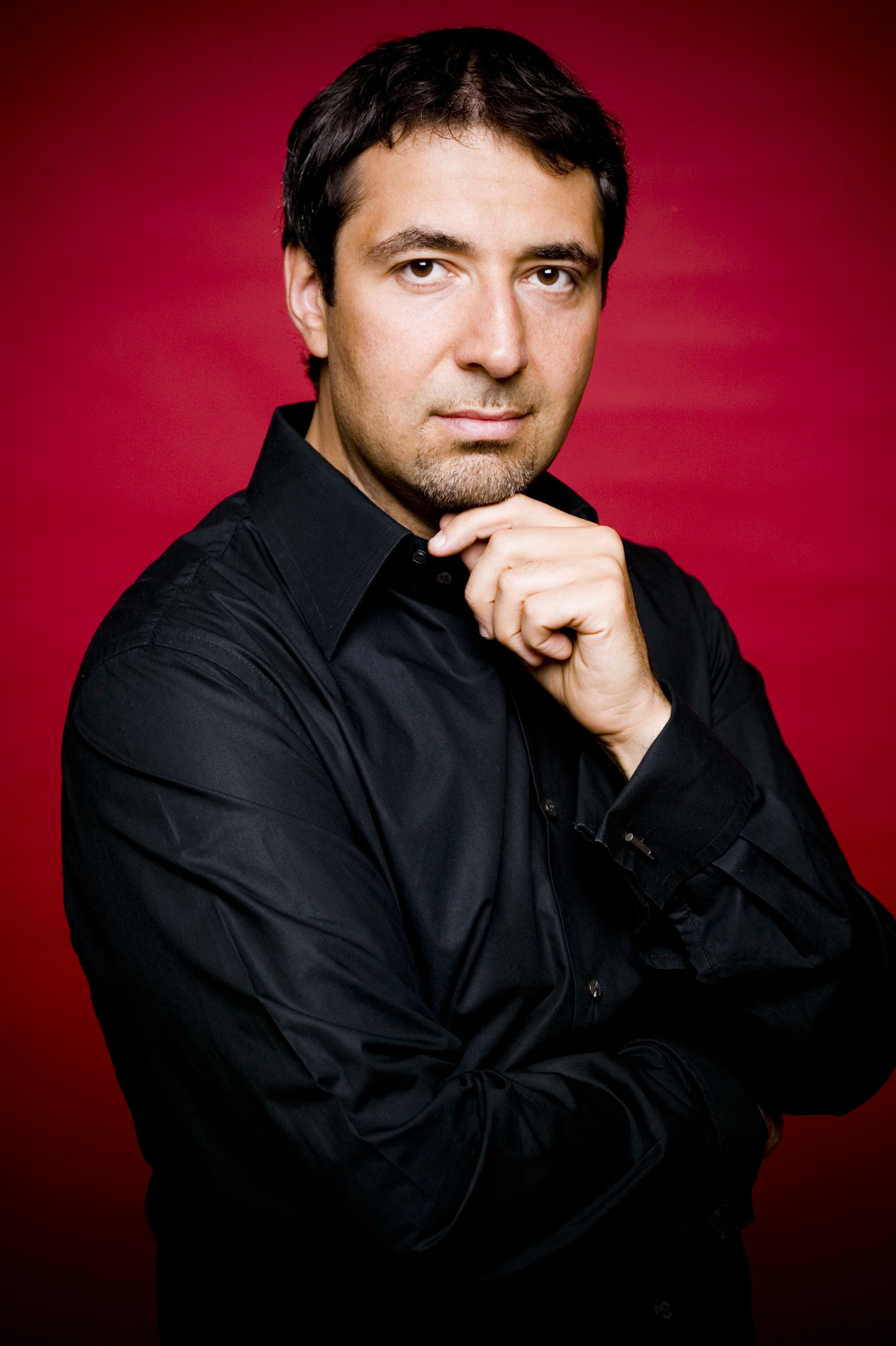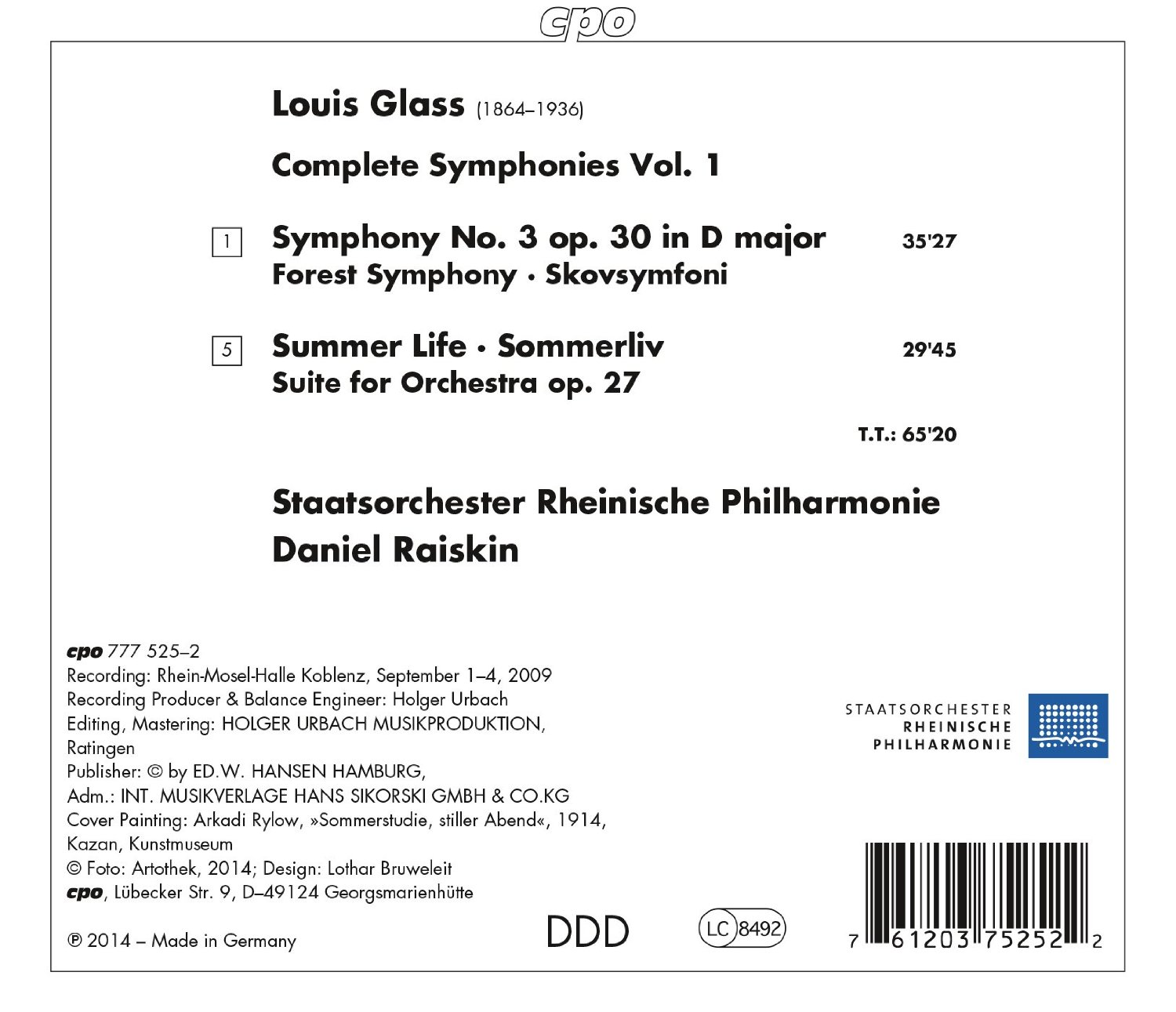Share This
Album at a Glance
Tags
Related Posts
- Salomon Jadassohn (1831-1902): Symphonies Nos. 1-4 / Brandenburg State Orchestra, Frankfurt; Griffiths
- William Wallace: Creation Symphony; Pelléas and Mélisande; Prelude to The Eumenides / Brabbins, BBC Scottish SO
- Alfred Bruneau: Requiem; Claude Debussy: Pelléas et Mélisande, Symphony / Ludovic Morlot
- French Romantic Cantatas - works by Catel, Boisselot, Hérold & Cherubini / Karine Deshayes, mezzo; Opera Fuoco
Louis Glass (1864-1936): Complete Symphonies, Vol. 1 / Staatsorchester Rheinische Philharmonie; Daniel Raiskin
Posted by Paul Ballyk on Feb 20, 2015 in Romantic | 0 comments
In these two works by Danish composer Louis Glass, musical reflections of our natural world are unmistakable; the idyllic air of a bucolic life surfaces time and again. Glass provides both works with descriptive titles - the third symphony is subtitled "Forest Symphony" and the title of the orchestral suite is "Summer Life". Glass's pastoral evocations are masterful. These, and the disciplined structural design of his music, and an ability to write passages of extraordinary beauty combine to produce exceptionally satisfying music. Conductor Daniel Raiskin and the Staatsorchester Rheinische Philharmonie provide first class performances and cpo supplies remarkably vivid sound with just the right bloom.
Louis Glass (1864-1936) was born in Copenhagen. During the early part of his career, he was considered one of Denmark's preeminent pianists, until a paralysis in one arm sidelined that course. Glass was an exact contemporary of Carl Nielsen and, like Nielsen, studied with Niels Gade. Early influences included Anton Bruckner and César Franck, and his music reflects the formal rigor of these composers; the opening movement of the Third Symphony is a textbook example of sonata form. His musical language is pleasingly tonal and rich with attractive melodies and satisfying harmonies and progressions, with characteristics of Richard Wagner and Edvard Grieg never distant.
The generous sample provided, with the kind permission of cpo, is the opening movement of Symphony No. 3, Op. 30 in D major "Forest Symphony", a work dedicated to the memory of Edvard Grieg. As mentioned, the movement is in strict sonata form, the first motif being stated in the opening horn call and the second following immediately in the first entrance of the violins. These themes are present in all four movements of the symphony, providing ballast and cohesion to what I found to be a thoroughly rewarding experience, each of the many times I listened to the symphony. This is highly recommended to any listener interested in discovering unknown gems of the late Romantic orchestral repertoire - listeners who most likely will need no further persuasion to obtain this recording than to hear the sound sample provided.
After Carl Nielsen, Louis Glass surely has to be regarded as Denmark’s greatest composer of the first half of the twentieth century. He began his career as a pianist, but when illness forced him to retire from active concertizing, he focused all his energies on composing. His six symphonies clearly occupy the center of his oeuvre. Early influence from Schumann, Gade (from whom he received instruction for a time), and Grieg soon yielded to influence from César Franck, whom Glass is thought to have met in Brussels. In his six symphonies, however, Glass also displays strong influence emanating from Bruckner, which was very unusual during this generation and beyond the borders of German-speaking Europe.
We are now beginning a new edition of this highly interesting work complex, together with shorter symphonic compositions, some of them in world-premiere recordings. Our Vol. 1 brings together the idyllic Forest Symphony No. 3 and the Summer Life orchestral suite, the former verging on chamber character and the latter uncommonly bright and colorful.
Source: CPO
 Louis Glass |
Louis Glass, composer Louis Christian August Glass (23 March 1864 – 22 January 1936) was a Danish composer. Glass, born in Copenhagen, was almost an exact contemporary of Carl Nielsen and like Nielsen was a student of Niels Gade. However, Glass also studied at the Brussels Conservatory where he became enamored of the music ofCésar Franck and Anton Bruckner, both of whom stylistically influenced his writing. For several years, he was one of Denmark’s leading concert pianists until a paralysis in one arm made him retire from the stage. He then devoted himself primarily to composing. He composed in most genres and wrote several chamber music works of worth, including four string quartets, a string sextet, a piano trio, a piano quintet and several instrumental sonatas. He wrote six symphonies (1893–1926), which have been recorded on the Danacord record label, while some chamber music has been recorded on the Da Capo label. Glass died in Copenhagen. Source: Wikipedia
|
 Daniel Raiskin |
Daniel Raiskin, conductor A son of a prominent musicologist, Daniel Raiskin grew up in St. Petersburg. He attended music school from the age of six and went on to the celebrated conservatory in his native city, where he studied viola and conducting. Inspired to take up the baton by an encounter with the distinguished teacher Lev Savich, he also took classes with maestri such as Mariss Jansons, Neeme Järvi, Milan Horvat, Woldemar Nelson und Jorma Panula. At the age of twenty, Daniel Raiskin left the Soviet Union to continue his studies in Amsterdam and Freiburg, and was soon in demand as one of Europe’s leading viola players, both as a soloist and chamber musician. He chose to make a gradual transition into a conducting career and soon became recognised as one of the most versatile conductors of the younger generation. Raiskin, who cultivates a broad repertoire, often looks beyond the mainstream in his strikingly conceived programmes. Since 2005, Daniel Raiskin has been the Chief Conductor of the Staatsorchester Rheinische Philharmonie in Koblenz, and since 2008 he has held the same title with the Artur Rubinstein Philharmonic Orchestra in the Polish city of Lódz. |
|
Staatsorchester Rheinische Philharmonie |
Staatsorchester Rheinische Philharmonie The State Rheinische Philharmonie (SRP), headquartered in Koblenz, is one of the three symphony orchestras in the Rhineland-Palatinate region of Germany. The SRP looks back on a long history: The roots of the traditional ensemble date back to the year 1654. To this day, the SRP gives symphony concerts in northern Rhineland-Palatinate, as well as in Germany and abroad. It is also responsible for the musical theater productions of theater Koblenz. The St. Petersburg-born conductor Daniel Raiskin has been the musical director and chief conductor since 2005. Source: Wikipedia (German) |
![]() About Paul Ballyk
About Paul Ballyk
all about Paul
Twitter •
| Thinking about purchasing this album?
Follow this link for more album details or to make the purchase. Buy it now |
“Not just recommended. Guaranteed.”
We stand behind every album featured on Expedition Audio. Our objective is to take the monetary risk out of music exploration. If you order this album from HBDirect.com and do not like it you can return it for a refund.







